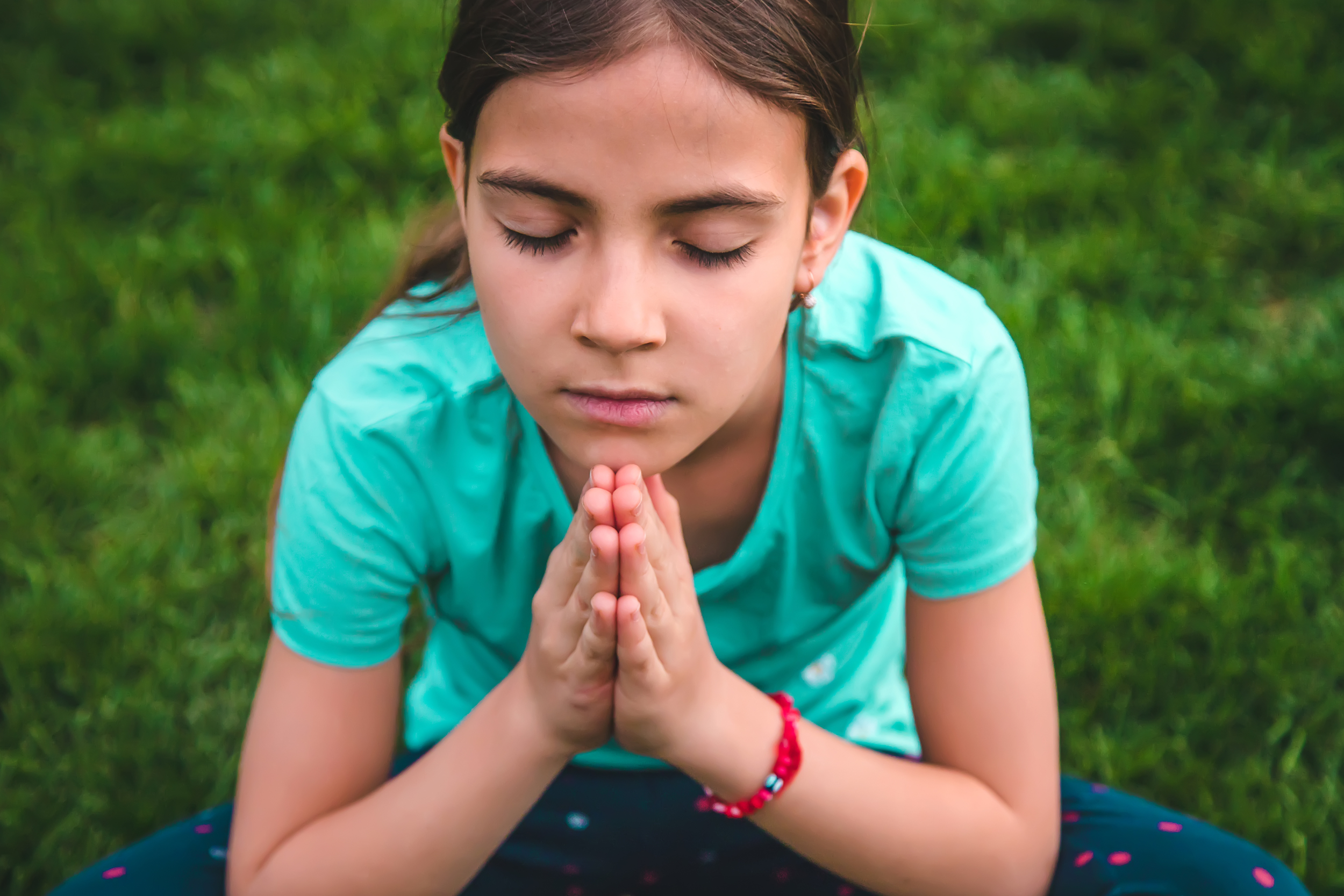How to Protect Your Child’s Mental Health

Table of Contents
If you have concerns about your child’s mental health, you’re far from being alone. Even before COVID-19, estimates showed almost 14 percent of Australian children aged 4 to 11 experienced a mental health disorder – that’s about one in seven children, or three to four in every classroom. And COVID-19 seems to have worsened the mental health situation.
A recent study by the Australian National University found parents and carers think the pandemic has caused a large negative impact on the mental health of their children aged 5 to 18.
However, this doesn’t mean your child is destined to experience mental health issues. God clearly knew people would struggle with things like anxiety, conflict, loss, and grief. King David, for example, poured out his pain, fear and suffering in many of the Psalms. The prophet Jeremiah wrote a whole book of Lamentations. Jesus himself lamented over Jerusalem (Matt 23:37-39) and wept over the death of his friend Lazarus (Jn 11:35).
Knowing we would all struggle this way, God has given us methods to deal with life’s challenges and look to the future with hope and confidence.
What Mental Health Is, and Isn’t
Before looking at ways to protect your child’s mental health, it’s helpful to understand what mental health is – and isn’t. Mental health is not about living in a state of constant positivity, free from emotions such as fear, anxiety, sadness, hurt or grief. As Jesus said, “In this world you will have trouble” (John 16:33), so we can expect circumstances that lead to difficult feelings like these. Importantly, though, this verse also tells us Jesus has overcome the world, and that we can experience peace in him.
Nor is mental health simply the absence of a mental disorder. The World Health Organization defines mental health as a “state of well-being in which the individual realises his or her own abilities, can cope with the normal stresses of life, can work productively and fruitfully, and is able to make a contribution to his or her community”.
A parallel can be found in Jesus’ statement that he came to not only free us from the power of sin and death, but to enable his children to live life abundantly (Jn 10:10).
Clearly, God expects us to experience challenging life circumstances, and wants us to look to him for strength, peace and joy as he does his most important work in our lives – transforming us into the image and likeness of Christ (2 Cor 3:18).
Understanding Your Child’s Mental Health
Good mental health is vital for the optimal wellbeing and healthy development of every child. Good mental health helps your child feel positive about themselves, establish good relationships, adapt to change and cope with the stresses of daily life.
However, childhood isn’t necessarily the rosy, carefree period it’s sometimes romanticised to be. Children have always faced difficulties such as poverty, famine, war, loss, abuse and separation from loved ones – and still do.
Today’s children also face pressures related to digitisation, such as the inability to escape bullying and constant barraging with ‘ideal’ body images and pornography. Your child’s mental health may be impacted by any of these things, and more.
Some children may be more vulnerable than others to developing a mental health condition. For example, some disabilities are associated with higher rates of anxiety or depression. Biological factors and environment can also play a role. However, often no cause can be identified for children who experience mental health problems.
It’s important to note that mental health conditions are not anyone’s ‘fault’, so don’t blame yourself - many factors contribute to complex issues. Instead, focus on recognising and addressing problems early, which can help improve outcomes and increase your child’s likelihood of growing to be a successful and capable adult, free of mental health conditions.
How to Identify Mental Health Concerns in Children
Children and teens can experience a range of mental health disorders including anxiety, depression, schizophrenia, and attention deficit hyperactivity disorder (ADHD). According to the Australian Government’s National Mental Health Commission, half of all adult mental health challenges emerge before the age of 14.
Signs that your child may be experiencing a mental health condition vary widely and will depend on your child’s age. However, some things to look out for include:
Emotional and behavioural signs of mental illness
- Feelings of sadness or crying a lot
- Frequent fear or worry, including separation anxiety
- Repeated tantrums or aggressive or defiant behaviour
- A return to behaviours they’ve outgrown, such as bed wetting
- Inability to sit still, restlessness, or difficulties paying attention
- Lack of usual energy or motivation
- Feelings of hopelessness or worthlessness
- Refusal to follow rules at home or school
- Ongoing guilt or negative feelings
- Playing in a violent or destructive way
- Bullying other children or pets.
Physical signs of mental health problems
- Changes to sleeping or eating patterns
- Physical symptoms that don’t have an obvious medical cause, such as tummy upsets or headaches
- Toileting issues
- Self-harming behaviours
- Use of alcohol or other drugs.
School and social signs of mental disorders
- Not doing as well at school as usual (e.g., a drop in grades)
- Difficulties with memory and concentration
- Avoidance of school or social situations such as birthday parties
- Trouble making or keeping friends or getting along with other children.
While all children might display some of these signs from time to time, it’s important to seek support services or professional help if they last more than a few weeks or are affecting your child’s ability to complete daily tasks (such as their schooling).
7 Ways to Protect Your Child’s Mental Health
Fortunately, there are numerous things you can do to support your child’s mental health and wellbeing and foster their development into a fulfilled, successful adult who loves the Lord.
1. Foster positive family relationships
Research shows that the quality of a child’s family relationships can have wide-ranging and enduring effects on their positive mental health. Children need secure, lasting relationships with their parents or carers to feel safe and to nurture their full potential.
Some things you can do to build a healthy relationship with your child include:
- Spending time together – simple things like cooking, going for a walk or participating in a hobby you both enjoy shows you care and helps to build family bonds
- Taking an active interest in your child’s life – for example, attending their sports or school events
- Showing your love – such as through hugs, cuddles and loving words
- Encouraging them to talk about what’s happening and how they’re feeling
- Listening to their concerns and acknowledging and respecting their feelings
- Creating a secure and harmonious home environment
- Providing advice and support.
Read more about parenting through your child’s school years here.
2. Build social connections for positive mental health
Developing connections with others has been shown to have a powerful positive influence on mental wellbeing throughout life. Some of the proven links between social connectedness and mental health include stronger self-esteem, lower rates of anxiety and depression, increased empathy, and more trusting relationships.
You can help your child establish social connections by:
- Regularly attending a church where they’ll meet peers and mentors
- Encouraging them to participate with others in a sport or hobby they enjoy
- Building friendships with other families who have children of similar ages
- Regularly visiting grandparents
- Encouraging them to volunteer or get a part time job.
This Tasmanian Government blog has a list of ideas to help young people who struggle to make friends. Making friends aids in reducing mental health problems, suicide prevention and general well being.
3. Foster physical wellbeing to reduce mental health problems
Physical and mental wellbeing are closely linked, so don’t underestimate the value of a healthy lifestyle. Exercise releases mood-boosting chemicals and has been linked with a host of mental health benefits, including reduced feelings of stress and anxiety.
A healthy, balanced diet may improve some of the symptoms of mental health disorders, while unhealthy eating and drinking habits can make them worse. Adequate sleep also plays an important role in building resilience and mental wellbeing.
4. Encourage resilience to reduce mental health conditions
Building your child’s resilience will help them to cope with and recover from challenging situations, such as bullying or friendship or family breakdowns. Having a strong, healthy relationship with your child is key to development of resilience. Other resilience-building strategies include:
- Encouraging self-respect and respect for others – for example, encourage your child to build on their strengths and recognise the strengths in other people
- Allowing them to overcome challenges and solve problems on their own
- Encouraging them to take responsibility and try new things
- Supporting them to develop social skills.
5. Nurture their faith
The most important gift you can give your child is the opportunity to know Jesus as their Lord and Saviour. The Bible directs parents to train their children in the way they should go (Prov 22:6) and provides numerous instructions for how to do this.
For instance, parents are advised to discipline their children (e.g., Prov 13:24, 22:15, 23:13-15; Heb 12:11; Eph 6:4), have compassion for them (Psalm 103:13) and teach them His ways (Deut 11:18-21).
Some ways to build your child’s faith include:
- Having regular Bible studies, devotions and prayer times
- Committing to a local church and attending regularly
- Enrolling them in a Christian school or home-schooling program
- Encouraging relationships with Christian mentors
- Supporting their participation in Sunday school/kids church, youth group or mission trips
- Reading books by and about Christians you admire
- Playing worship music in your home
- Memorising Scripture verses (you could focus on verses that relate to mental wellbeing, such as Matt 6:25 and 11:28-30, Jn 14:27, 1 Pet 5:7, Phil 4:6-7, and many verses in the Psalms).
6. Look after yourself
Caring for a child who has a mental illness can be exhausting and stressful. Looking after your own wellbeing will enable you to better care for them. Take some time out to nurture your own health and relationships, including your relationship with God. A child with mental health problems is not well served by a parent with their own mental health conditions.
7. Seek support
If your child’s mental health issues are impacting their everyday life or you’re concerned about their (or your own) mental wellbeing, seek professional assistance. Your GP is a good place to start. They can refer you to other professionals if they identify any mental health conditions, so your child can receive a customised action plan.
You can also draw on your support networks, such as family members, pastors, youth leaders and your church. You’ll likely find many support people who are eager to help if you’re going through a difficult time. Take proactive steps early to reduce the likelihood of more serious issues like self-harm and suicidal intentions. People with mental health challenges need support.
How to Communicate with Your Child About Their Mental Health
If you have concerns about your child’s mental health, it’s important to talk to them about it. People with mental health problems really appreciate being able to talk through their issues. Persistent thoughts, if left unchecked, can lead to serious problems. However, some children may feel awkward or embarrassed opening up about their feelings, and others may find it hard to put their concerns into words.
Here are some tips for communicating with your child about their mental health:
- Find a private place where your conversation won’t be interrupted or overheard.
- Tell your child you’ve noticed they don’t seem to be themselves (eg they seem sad, anxious or distracted) and you want to help.
- Listen without interrupting, judging, or jumping in with potential solutions – your child is more likely to share openly if you’re calm and accepting.
- Explain that it’s common and okay to feel sad, worried, confused, or anxious.
- Tell them that opening up about thoughts and feelings can be scary, but it can also help them to understand what’s happening and start working towards a solution.
- Be patient and encouraging as they try to find the words to express themselves.
- If they aren’t ready or you hit a barrier, don’t force the issue. Tell them you’re ready to listen whenever they are ready to talk.
- Take their feelings seriously and be prepared to seek professional support if your child shares serious concerns such as feelings of hopelessness or thoughts of suicide.
Become More Connected with Your Child and to God
While nobody would wish for their child to experience struggles with their mental health, going through them can be an opportunity for your family to draw closer to one another – and to God. The Bible promises that trials and the stresses of life help to develop perseverance, character, and hope (Rom 5:3-4), and are achieving for us an “eternal glory that far outweighs them all” (2 Cor 4:17) .
When things are tough, it can help to focus on the fact that God uses hard times to teach us important lessons and make us into the people he wants us to be. He promises to draw close to people going through troubles (Ps 34:17-18).
We can look to him with confidence, knowing that no matter what life throws our way, God has foreseen it and plans to use it for our good and his glory.





